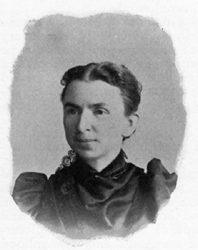WOMAN'S LIFE IN ASIATIC TURKEY. *
By MISS MARY PAGE WRIGHT.

|
| MISS MARY PAGE WRIGHT. |
Life is monotonous and sad for woman, especially because: (a) They are held to be essentially inferior to man. (b) They are ignorant, most of them being unable even to read, in spite of the recent and much lauded efforts of the sultan to establish schools for girls (the standard of education in these schools may be inferred from the recent act of the censor of the press in forbidding the publication of a certain text-book on chemistry, because he interpreted the symbol of water, H2O, to mean " Hamid II."—the reigning sultan—is naught.) (c) Because of the miseries of polygamy, the seclusion of Moslem women in their harems, and (e) The subjection of Armenian wives to their mothers-in-law.
The Turks are indeed extremely urbane, and Mrs. Gen. Wallace, as wife of the American minister to the Sublime Porte, would naturally only see such agreeable phases of life as appear in her beautiful pictures of the Orient; but neither she, nor any other diplomatic officer's wife, lives or travels much in the interior of the land.
To the missionary long resident in the interior, the prevailing feeling of the women seems to be expressed in a phrase often upon their lips, "Blessed are you American women; you can read, you have souls, but we are only cattle;" or in the eager questions of a girl who said: "Is it true, teacher, that American girls can have money of their own?" "Yes."
"Can American girls and women sit down and eat at the same time with their husbands, brothers and fathers? And don't they have to stand behind their chairs and wait on them; and when they have done, then they have a chance to eat and not before? And, teacher, is it true that American girls have the same privileges of appearing on the streets and of coming and going that boys have? Is it true that American women are to have all that and heaven too?
The Turkish music in the Midway Plaisance, with those monotonous minor strains, well expresses the tone of life in a land where Kismet (fate) is held to be supreme.
[Page 305]
Miss Mary Page Wright was born at West Jersey, Stark County, Ill., February 17, 1848. Her parents were Rev. Samuel G. Wright, who was a home missionary for fifty years, and Minerva Hart Wright. She was educated at Adrian College, Adrian, Mich., and at Rockford College (then a seminary), where she graduated in 1871. In 1874 her election as superintendent of public schools for Coffey County, Kansas, furnished the Supreme Court the test case in the decision that sex is no disqualification for that office. She has traveled a few weeks in Europe, and extensively in the interior states of the Union, and in Turkey. Miss Wright is a teacher, and was for eight years missionary to Turkey in Asia, under the direction of the American Board of Commissioners for Foreign Missions (Congregational). Her only literary works are miscellaneous contributions and the "Woman's Journal Advance," "Kansas Magazine" and missionary papers. Postoffice address, Rogers Park, Ill.
* The above is but a synopsis of the address delivered by Miss Wright. She was assisted by Miss Gertrude E. Wilcox, of Chicago, who appeared in the costume of a rich Armenian bride; her mouth concealed, as custom requires of Armenian wives.